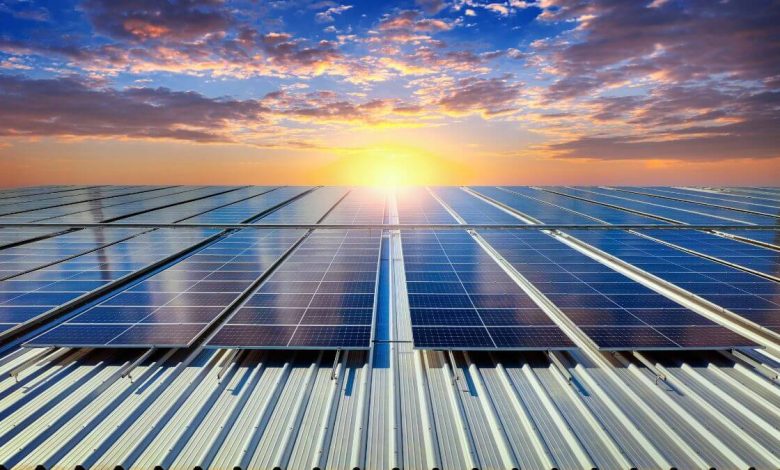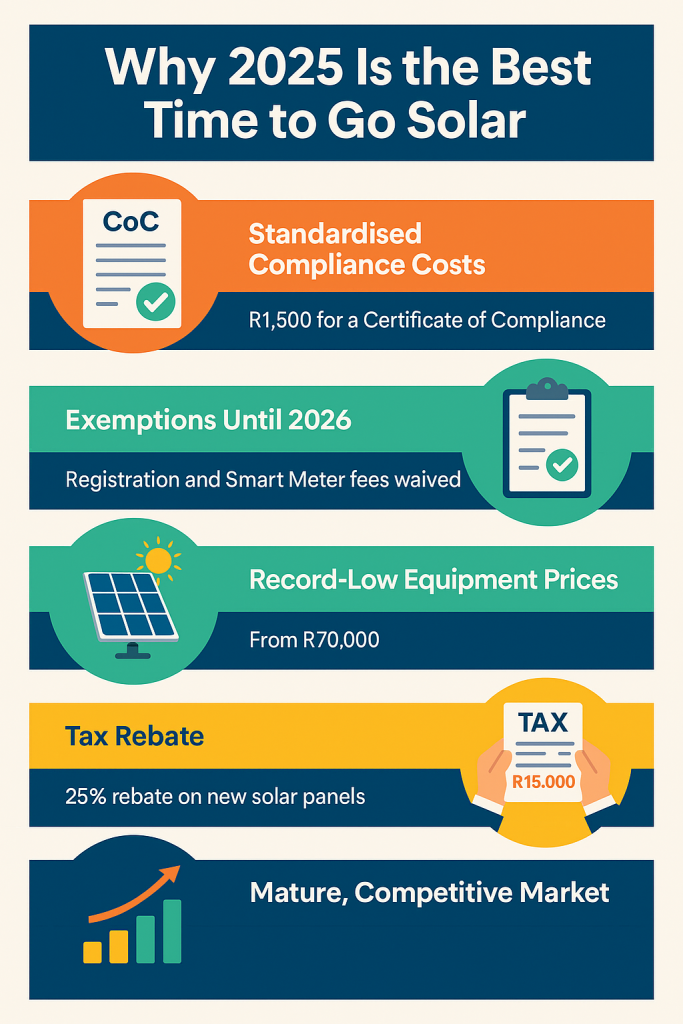Now’s the Best Time to Go Solar in SA as New Rules Cut Costs

South Africa’s Solar Moment Has Arrived
Now’s the Best Time to Go Solar – and that’s not a marketing line, it’s backed by new rules, low costs, and solid incentives. South African homeowners have a rare opportunity in 2025 to take control of their energy future. If you’ve been hesitant, this is your sign to take the leap.
Streamlined Compliance Means Lower Costs
One of the biggest barriers to residential solar in the past was inconsistent compliance costs. That has changed.
The Department of Mineral Resources and Energy has introduced a standardised Certificate of Compliance (CoC) fee, now pegged at around R1,500. Previously, fees ranged between R850 and R2,500 depending on the property.
This new rule provides predictability and affordability. It also ensures installations remain safe and legally compliant – no surprises, no hidden charges.
Residential Exemptions Extended to 2026
Eskom’s exemption on registration and Smart Meter fees for residential solar installations up to 50kVA remains in effect until March 2026.
This exemption covers most home systems and removes yet another administrative cost. Combined with the new CoC regulation, going solar has never been simpler.
For homeowners who want to avoid red tape and maximise value, now’s the best time to go solar.
Solar Instalation Equipment Prices at Record Lows
As of mid-2024, equipment costs dropped sharply. Here’s a look:
- Small home backup systems: From R40,000
- Entry-level residential systems: From R70,000
- Full off-grid solutions: R143,000 – R381,000
Why the price drop? South Africa saw over 15,000 MW of solar panels imported in the 12 months to June 2025 – a 60% increase. The bulk buying and competition drove prices down.
That means you get more power for less money.
Tax Rebates Sweeten the Deal
Government incentives remain a key driver of solar adoption. South African homeowners can claim a 25% tax rebate, up to R15,000, on new solar panel installations.
This rebate, combined with lower hardware and admin costs, shortens your payback period. Many homeowners now recover their investment in under five years.

A Solar Market That’s Booming
South Africa’s solar sector is forecast to grow by $3.74 billion between 2023 and 2028. This isn’t a bubble. It’s long-term, sustainable growth driven by need, innovation, and policy.
A growing market also means:
- More competition = better prices
- More providers = faster installations
- More innovation = better tech
Solar is no longer niche. It’s mainstream – and it’s here to stay.
Solar Installation: The Convergence of Opportunity
Here’s why 2025 is different:
- Standardised CoC costs (R1,500)
- Registration & Smart Meter exemptions (until March 2026)
- Lowest ever equipment prices
- Tax rebates up to R15,000
- Mature, competitive market
Add South Africa’s electricity instability and rising tariffs to the mix, and solar becomes a smart financial move – not just a green one.
What You Need to Do Next
Ready to go solar? Start by:
- Getting quotes from certified Installation Electricians or Master Installation Electricians.
- Checking for compliance with national safety standards.
- Confirming the CoC cost and exemption status.
- Applying for the tax rebate via your SARS eFiling profile.
Every step is now clearer, cheaper, and faster than before.
Don’t Wait for Load Shedding
If you’re still relying fully on Eskom, you’re vulnerable to price hikes and blackouts. Solar offers peace of mind, lower costs, and long-term savings.
Frequently Asked Questions (FAQ)
1. Why is now the best time to go solar in South Africa?
2025 brings multiple cost-cutting advantages:
- Standardised compliance costs (R1,500)
- No Smart Meter or registration fees until March 2026
- Equipment prices are at record lows
- A 25% solar panel tax rebate (up to R15,000)
These savings significantly reduce the upfront and long-term cost of going solar.
2. What is the Certificate of Compliance (CoC), and why do I need one?
The CoC confirms that your solar installation meets South African safety standards. It is legally required and now has a capped cost of R1,500 for residential properties.
3. Do I still have to pay Eskom fees when installing solar?
No, Eskom has waived registration and Smart Meter fees for home systems under 50kVA. This exemption is valid until March 2026.
4. How much does a typical home solar system cost in 2025
Prices vary by system size:
- Backup system: From R40,000
- Entry-level hybrid system: From R70,000
- Full off-grid system: R143,000 – R381,000
All prices include installation and hardware.
5. What tax incentives are available to homeowners?
You can claim a 25% tax rebate on solar panels (up to R15,000). This applies to new installations and must be claimed via SARS eFiling.
6. How do I choose a reliable solar installer?
Only use certified Installation Electricians or Master Installation Electricians registered with the Department of Employment and Labour. They ensure your system is compliant, safe, and eligible for rebates.
7. What is the typical payback period for a solar investment?
Most homeowners recover their investment in 3 to 5 years, depending on electricity savings, tax rebates, and system size.
8. Will going solar protect me from load shedding?
Yes, if your system includes battery storage or is off-grid. Backup systems provide uninterrupted power during blackouts.



